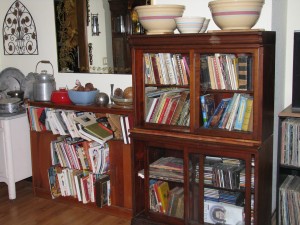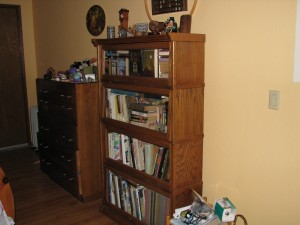Reading to a Fault

I need to confess: I read. Perhaps all of you are nodding, thinking that you, too, read. I’m very glad of that. However, my confession is something along the lines of AA. I read to a fault. I read between 3 and 5 books a week. Yes, all of them are over 200 pages, and no, none of them have embracing couples on the front. I read myself to sleep. I read myself awake sometimes. I’ll take a break in the afternoon and read, and wind up several hours later with very angry cats nagging me for their dinner. I have a stack of bedside books, books in the library, a book in each car in case of emergency. I’ll read until I have less than half an hour to wash, dress, feed animals, grab food and drive somewhere. I have read long through the night when I have needed to be up in the morning early.
I feel sometimes that I’ve been consumed by the books.

I read too quickly. I could not recite the plots and names of the characters in the books that I read, and that is a major fault. I have a good friend who reads steadily and slowly, and can call to mind all the characters and all the plot points in all the books that he has read. I envy him that.
I read mostly fiction, but I always keep at least one non-fiction going at all times. I particularly enjoy well-crafted and researched historical mysteries. I have learned more about the history of the world, the nuances of human struggles and the colossal efforts to survive in the face of war, disease, political and religious oppression, starvation and exhaustion, than was ever even hinted at in any of my schooling. For instance, the Sister Fidelma mysteries are written by historian Peter Tremayne and concern the changeover from the ancient Celtic traditions to the strict and woman-hating traditions of the newly approved Roman Catholic Church in 7th century Ireland. In the Celtic world, women could be judges, teachers and could own property. There were universities throughout Europe. The Picts were still present, and their written word Ogham took the form of slashes on sticks, which were bundled together to form long documents and hung on walls to form libraries. The first witch hunts began when the Roman Catholics wanted to obtain land and power from the women and subjugate them. A man who proved a woman a witch could have her property and belongings, and the tests for being a witch were hard to survive (drown and you are innocent, float you are a witch).
From C. J. Sansom’s Mathew Shardlake series I learned about 16th century England and just what the dissolution of the Catholic church meant for the monks and the parishioners, and how life must have been like under a king who regularly took young wives, and had them killed when they didn’t produce a son.

From Anne Perry I’m learning about Edwardian and Victorian England, the oppression of women, of the poor, of the inadequacies of the medical practice (they just discover chloroform so that operations can take a little longer, although most patients died of infection afterwards, anyway). About the threat of disease from the lack of sewers and the incredible labors it took to build the new sewers, and new railroads.
Elizabeth Peters has shown me Egypt at the turn of the century, in a series of mysteries that are as funny as they are educational. The Amelia Peabody series is priceless; three of our chickens are named after characters in those novels, so you can see how important it is to us! (Emerson, Miss Amelia and Evelyn).
In non-fiction I prefer travel writing. I’d love to travel the world, lingering in each place to absorb the language, the customs and the landscapes. If only I could do that while also staying at home! Travel writing allows me to vicariously see the fascinating corners of the world without suffering from airports, taxis, buses and car rentals, or trying to find vegetarian meals in a meat-loving place. I enjoy some Paul Theroux, Freya Stark, and many more who have helped me cross Africa on foot, hike through Tibet sipping hot tea with goat butter, fight the overwhelming fecundity of the sweltering, buggy Amazon rainforest, and sail through terrible storms and dead calms.
I also love to read non-fiction about animals, such as the books written by Gerald Durrell, or about wolf re-introduction (thanks, J & J!), or what survives in extreme weather. And about gardening and the love of nature and home such as Sue Hubbell’s A Year in the Country.
There is also satire such as Terry Pratchett’s Discworld series. Incredible writing, a double-take kind of humor that makes you love your fellow man as you laugh at and with him.
I remember the first book that I read alone when I was five. It was a collection of fairytales. I still have it although it looks much smaller now. I remember getting through it the first time and feeling so accomplished, and then reading it again and realizing how quickly it went. Little did I know that I would be a slave to the written word from then on. My parents read when they could, and greatly supported reading. We’d attend the Carlsbad Library Book Fair, and I’d always order thin, wonderful books from the Scholastic Book Fair at school. I loved Sherlock Holmes, Agatha Christie, Tolkein, and The Three Investigators (so much better than the Hardy Boys!). I worked at B. Dalton Booksellers on the El Camino Real mall, then met and married another book lover who was a manager there. He became a book scout and I was once again going through stacks of books at sales again, trying to find treasures. After a divorce and a career as a Park Ranger I became a middle-school librarian for eight years. Heaven! All those old favorites, added to purchasing books at a time when young adult literature was exploding. So many well-written and well-researched, imaginative books! I still follow young adult authors because what they write is often so much more rewarding and intellectually stimulating than popular fiction. In fact, some of my go-to fiction when I need something familiar and comforting is from the young adult genre. Tamora Pierce and Sharon Shinn, to name a couple.

I’ve never been a bestseller-list follower, nor a lover of award winners or book club choices. I have had almost-conversations with women who are also good readers, and we have almost no books in common. A couple of notable exceptions have been the Guernsey Literary and Potato Peel Pie Society by Mary Anne Shaffer, and finished by her daughter-in-law Annie Barrows when the author was ill, and the Ladies No. 1 Detective Agency series. The former because it is warm, humorous, and yet describes the horror of living on an occupied island during WWII. The latter because it exposes a completely foreign (to me) way of life of a village in Africa and the warmth, simplicity and traditions of the people there. Both of these make me feel warmly towards the human race, which is something I need encouragement to do. Books that dwell on hopelessness, horror, unrelieved pain and despair, I just won’t give a time of day to. Also those mysteries that are violent and graphic for the sake of selling copies. No, thank you. Just keep my mind working and my interest peaked, thank you.
So I read and read. Have I mentioned audiobooks yet? They are on top of the reading books. At one point I had an audiobook for the car, one for the house, and one in the wings just in case. I usually have one or two in the car now. I listen to audiobooks of authors I probably wouldn’t sit down to read, or of books that are deemed important, award-winning or classic that I’ve either read and forgotten about, or never read for one reason or another, such as Pulitzer prize winners. There are audiobook readers who are superb at what they do, such as Barbara Rosenblat, and some where I’ve had to shut the audiobook off because the reader was so terrible. Usually authors really mess up their own work, so I try and avoid those. I’ve had audiobooks playing in a CD player attached to an extension cord out in my yard so that I could listen while weeding. The problem with that is you can’t easily leave the area even for a second because you’ll miss something, and your hands or gloves are too dirty to touch the CD to pause it. Areas of my yard have an afterglow of memory of the audiobook I listened to when I was working their: my side yard is very much the 1100s in Shrewsbury, England on the border of Wales where Ellis Peter’s Brother Cadfael is grinding herbs and solving mysteries. My backyard has a memory of the cold sea from listening to Anne Proulx’s The Shipping News.
I volunteer at the Fallbrook Library bookstore The Bottom Shelf once a month or more (there are set times and I’m also on the fill-in list). Three hours guaranteed guilt-free shopping in a dynamic used book store: dangerous! So many incredible books! Old friends, and new friends, and books from other countries and on topics I’d never thought of. How I love filling the shelves and keeping an eye out for my favorite authors! In come people with their lists. Decades-old index cards on keyrings that have tiny lists of titles from alphabetized authors, small notebooks, and school paper falling apart at the folds. I have my own lists carefully saved in my purse, as well as a regular notebook at home with authors and their complete works listed chronologically by publication date with notes about the series and author and how I liked them. I also post my books and some reviews on Goodreads, which is a virtual personal library list. I wish that I could remember all the books I’ve read in my life so that I can list them all and be complete. Perhaps book people are also list people. Gotta have a list. I buy books at a quarter, read them and return them. Can’t beat that.
Reading is a treat, a reward, a hobby, an education and an escape for me. I don’t watch television; I haven’t had it hooked up for about 16 years except to play DVDs and VHS tapes. I often wish that I could directly link all the books to my brain so that I can absorb them all and have all that knowledge. Oh, and have a memory that will handle it, too! I share books with my family and friends. I read aloud to my children until they were in high school, including the Complete Sherlock Holmes, all the Redwall series, most of Musashi, and stories from James Herriot, and many, many more, usually with me falling asleep while I’m reading and finishing the sentence with some garbled words my dream self interjected.
I have many faults, but few vices. I don’t drink often, smoke, or take much medicine or drugs. I may read murder mysteries but I can’t even feed a tomato hornworm to the chickens. But I read. Books, not electronic devices. I love the feel of a book. And I hope I always will.
One Comment
Toni
See…I was correct…you don’t sleep! 🙂